5 black women and men share their unapologetic natural hair stories
The natural hair movement — and its resurgence in recent years — has reaffirmed just how entangled self-identity is in the very way black women and men wear their hair. From Assata Shakur’s dreadlocks and Cicely’s Tyson’s intricate cornrows to Colin Kaepernick’s Afro and Lupita Nyong’o’s Fulani-inspired topknot, these natural hairstyles are political, cultural, and artistic forms of expression which intricately tell stories of struggle and success.
However, European standards of beauty and culture vultures (ahem, Kim Kardashian and her “Bo Derek” braids) continue to dominate society’s perceptions of “beautiful,” “professional,” or “acceptable.” This fuels negative stereotypes about black people with natural hair and racially insensitive policies (such as school dress codes and the Army’s grooming policies) that may affect a person’s self-esteem.
According to saxophonist and educator Brent Birckhead, who has waist-length dreadlocks, the stigma against black people with natural hair is rooted in not dealing with and confronting race issues in this country.
“The conversation has to be brought up because when you’re growing, it’s going to be uncomfortable,” he says. “There’s going to be agitation. So actually speaking about a thing that makes you uncomfortable will inevitably help us grow together. We have to know what’s going on to fix the problem.”
In honor of Black History Month, Yahoo Lifestyle is furthering the discussion on natural hair by speaking with five individuals who learned through adversity how to embrace and celebrate their curls, kinks, braids, and locs with pride.
A Yahoo Lifestyle Exclusive. Photos by Natalia Mantini. Art direction by Jennifer Fox and Nadeen Nakib. Hair by Diane C. Bailey and Jennifer Lord for SheaMoisture. Makeup by Tedrick LaMar.
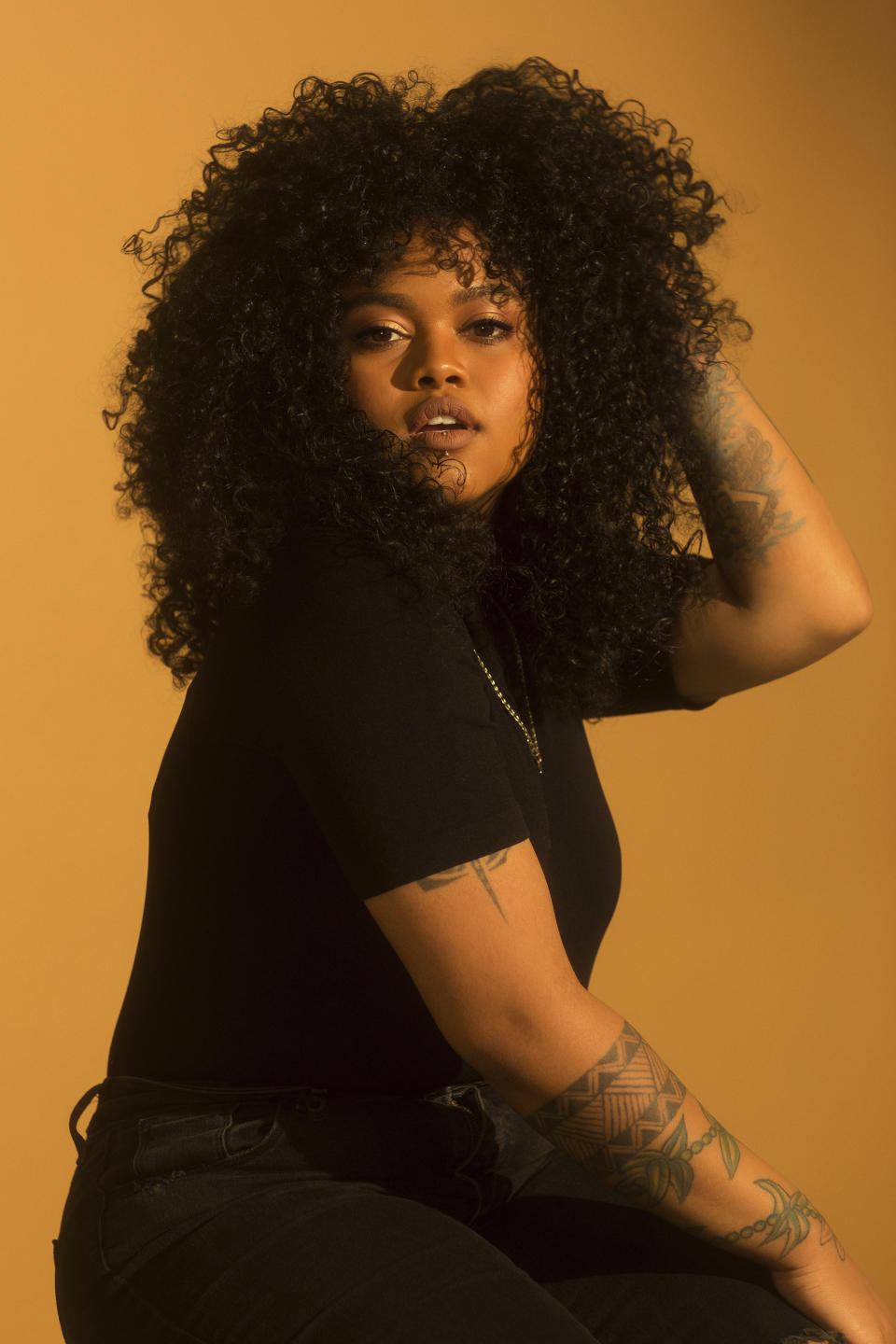
Taija Kerr, 23, makeup artist
Why natural hair is important to black history: It is the root of our culture. It’s what comes from our bodies and it expresses our beauty from the inside out. Black girls just have swag with the hair.
I grew up around black women, so textured hair was something we never bash each other on. We uplifted each other. I feel like as a woman of color, the first thing we teach our baby girl is how to do their hair.
On what her natural hair represents as an Afro-Hawaiian woman: When I take my hair down, it’s literally everything you need to know about me.
I was blessed to grow up with two different parents — my mother is black and my father is Hawaiian. So when I look at a Hawaiian queen, usually she doesn’t have hair like mine. Her hair is more wavy and straight and long. My mother’s hair is short; she has a lot of shrinkage, when she pulls her hair it’s like “ping!” and it just comes right back. So I got literally in between the two. I have some fluff at the root but I also have a wave when it comes down to the end.

Why she refuses to straighten her curly hair to look “professional”: I will not straighten my hair for any job interview, for anything in print. I just won’t do it. It is who I am and how I express myself without even saying words to you. For you to tell me that my hair is not professional? Hmm.
My natural hair is… Diana Ross! You see Diana Ross, you see that hair. You see diva. You see personality. She just has her own characteristics that are not explainable. And when you see my hair, you can’t just say pretty. You can’t just say nice. It’s Diana Ross!
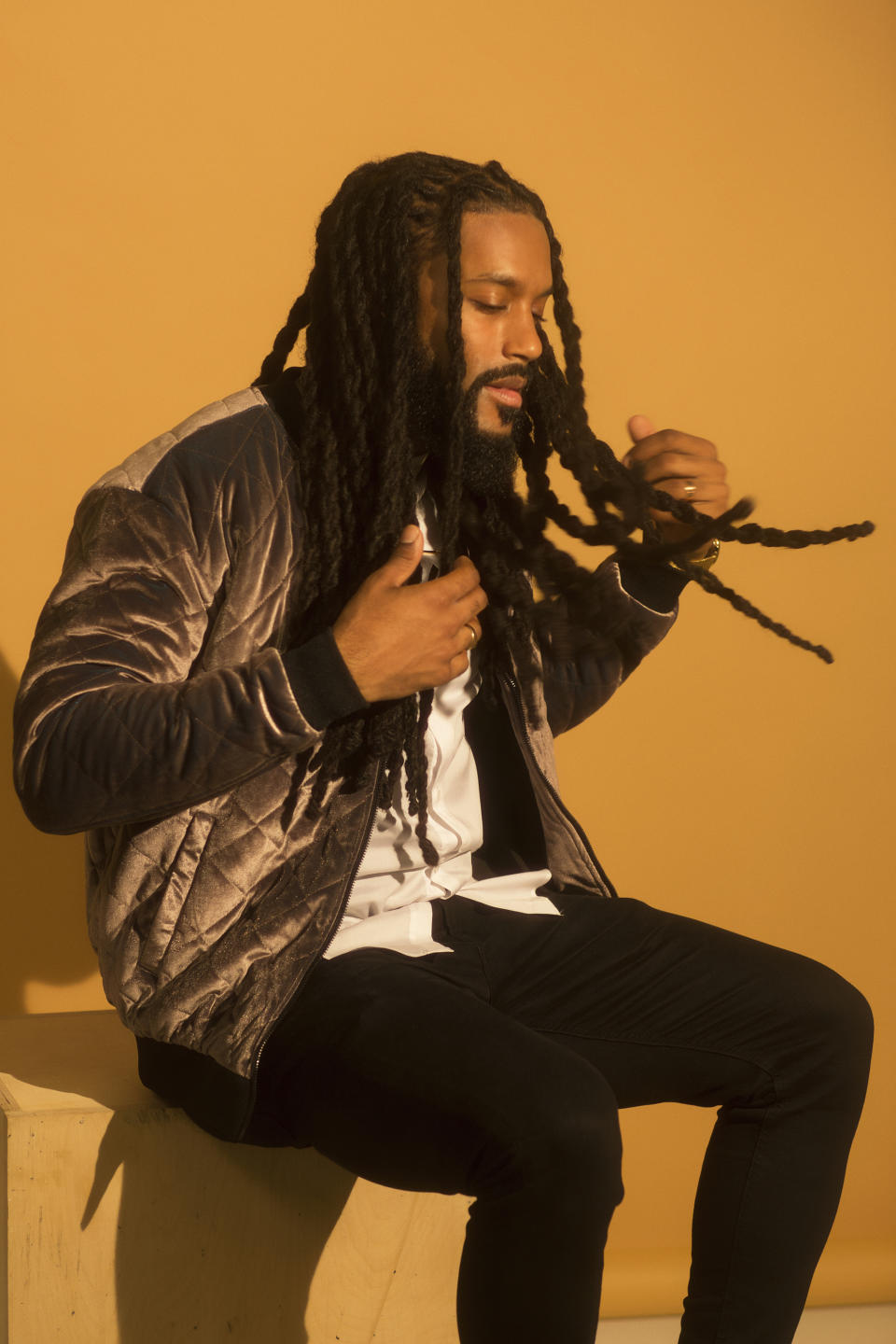
Brent Birckhead, 32, saxophonist, composer, and educator
How standards of beauty are represented in media: They want you to straighten your hair. They want you to cut your hair so that it’s more presentable. What does presentable mean? You really have to think about that question. To me, the way my hair grows out of my head is the perfect representation of me because it comes out of my body. Why do I need to put chemicals on it? Why do I need to do anything except leave it be? My hair is the most professional that it can be for me. So when you discriminate against me for my hair that grows out of my head, what message does that send?
Why natural hair is important to black history: Our hair really represents our resistance against the status quo. It’s a representation of freedom.

On school dress codes that discriminate against natural hair: There are students that go to school and are put out because they have an Afro or they have cornrows. It’s in the bylaws. What does that say to that student? That says to that student that you’re not good enough. What grows out of your body is not good enough. That would tear somebody apart from birth. It’s very tough to realize that, but what we need to really realize is that you’re beautiful. What you have is legitimate. What you have is exceptional. What you have is the best!
My natural hair is… Power! My hair represents patience, wisdom, freedom, resistance, resilience. It’s everything. This right here should not be something that’s criticized. It should be something celebrated.

Mildred Bean, 57, life coach and social media influencer
On embracing her natural gray hair: I decided to wear my hair in its natural texture and color because I no longer wanted to deal with the chemicals. I no longer wanted to deal with keeping up the processes of keeping the roots dyed and keeping my hair fried.
When I attend natural hair events or any type of event in the beauty industry, I’m often approached and complimented about my hair — the texture, as well as the color. I’m often told, “Oh, I love your hair. I could never do that.” And generally, I’ll tell people, “You’ll do it when you’re ready.”
Why natural hair is important to black history: This is how our hair grows out of our heads. This is the way we were born and it takes us back to our roots, as opposed to conforming to the European standard of hair.
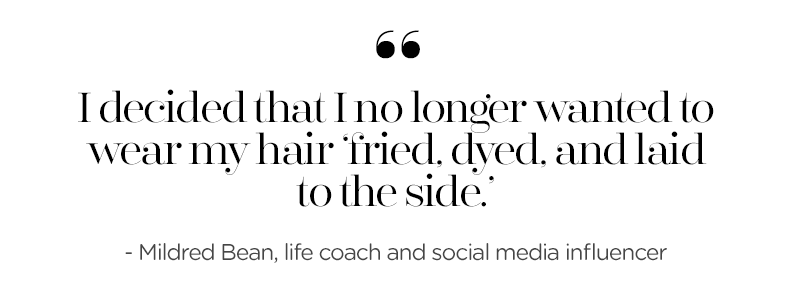
The myth about black women with natural hair she’d like to debunk: Women who decide to wear their hair natural are militant, rebellious, or antiestablishment.
The message she’d like to send to the younger generation: They can be themselves. They should not worry about or be too concerned about being accepted or wearing their hair according to standards of beauty. And if they decide to wear their natural hair, they should just do it with boldness and pride.
My natural hair is… Kinky and unruly and unmanageable and outright disrespectful, but I don’t mind because I like it this way. This is the way it grows. And I’m quite happy with it.
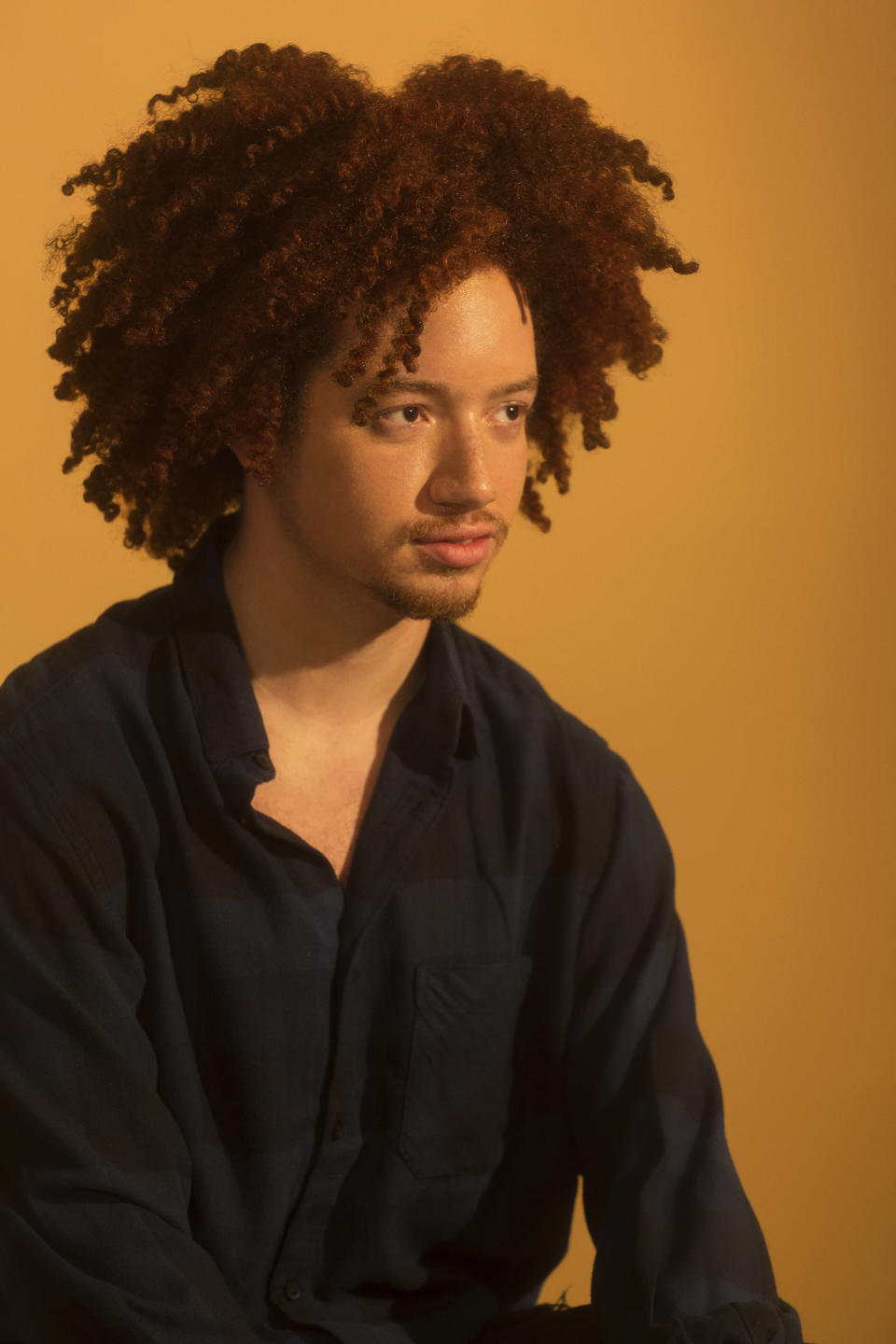
Brandon Hernandez, 21, communications student
Why it’s not OK to touch his hair: People see me and they … just want to touch my hair without asking. They feel like they have some right to touch who I am. When you go up to a person and just touch their hair, it’s so degrading. It kind of makes me feel like I’m some sort of pet or you have some right over who I am.
On Instagram’s natural hair community: I love to use Instagram to celebrate who I am. It’s an amazing thing, especially when I see younger kids being able to go on my page and see who I am. I really hope it touches them, because I wish I had that when I was growing up. Growing up, I just saw black men on TV with short haircuts and women pressing their hair or wearing weaves. So it’s really great for me to touch a younger generation and show them that natural hair is beautiful, natural hair should be celebrated.
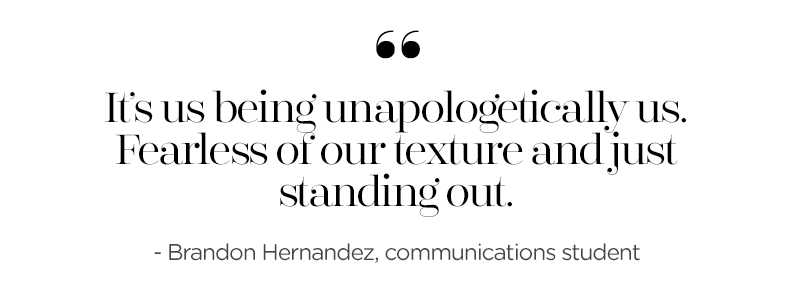
Why natural hair is important to black history: It’s who we are at the core. It’s us being unapologetically us. Fearless of our texture and just standing out.
How his parents influenced his outlook on natural hair: My parents are definitely embracing of my natural hair, especially my mother. When I was younger, she was the one that sort of cared for my hair, that told me every day — even when people would make fun of me or ask if I was a girl or why is my hair so long — your hair is beautiful, your hair is what makes you you. And now today, those words have still stuck with me.
My natural hair is… Me!
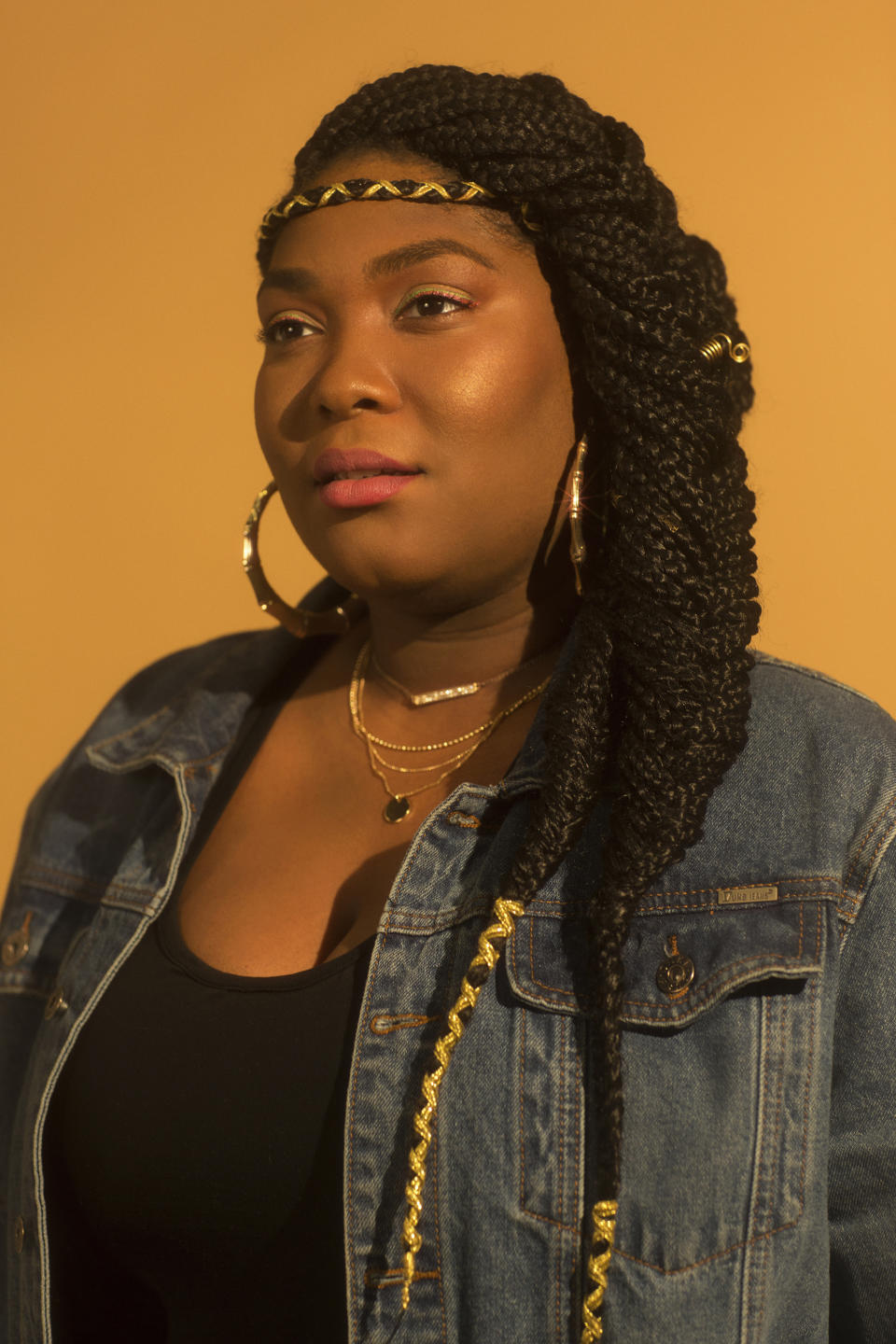
Tiff McFierce, 31, DJ and personality
Why natural hair is important to black history: For so long we’ve been pushed this standard of beauty and not able to be shown — especially for me growing up — that I could be beautiful as I am. And I think it’s just important for us to know about that part of us. If you want to do whatever with your hair that’s fine, but it is important to know what’s naturally yours.
On facing discrimination because of her natural hair: In the line of work of entertainment that I do, I’ve had people want me to “be more black” or “I’m too black” or “my hair is too much” or it’s “too urban.” My look has always been something discriminated against, but I don’t care. I just do whatever I want anyway.
How YouTube videos on natural hair affected her self-esteem: When I first started wearing my natural hair out — it’s been about seven years now — I watched all these YouTube videos after I discovered that there were people on YouTube doing this. I tried to figure out what type of hair I had and I’d look at other girls and be like, “Oh, I have this type of hair, I have that type of hair.” Then it got worse and I’d say, “I wish I had that type of hair.” I think that social media sometimes makes you feel like if your hair is not a loose curl then it’s not the best thing to wear out. You might want to manipulate it more so it looks like this, and that’s just such a lie. That’s a bold-faced lie. Your hair is fine however it is.

What the transition was like going from relaxed to natural hair: My journey from wearing my hair relaxed to natural consisted of a lot of breakage because I was wearing a weave to try to grow it out. I didn’t Big Chop or anything like that. But the front of my hair was long and left for leave-out to cover my tracks. I just kept flat-ironing this section of my hair and it just broke off so much. That transition was also tough for me because I was coming from always having long hair. That was one of the things people would compliment about me, so I was very attached to my hair. The transition for me was just a shedding of false ties to my worth … to my hair.
Reflecting on the first time she wore an Afro: I didn’t wear an Afro until about 2015. The first time I did it, I was running late for something and I washed my hair and blew it out. I was going to braid it up and do something, but I was late. I was like, “You know what, I’m just going to wear it like this.” Doing that showed me I don’t have to manipulate anything. I can wear my hair as is. Of course, I’m going to put it together and make it look cute. But it doesn’t have to be this loose curl or this type of kink. It can be just whatever it is.
My natural hair is… Fierce! I can do whatever I want with it, and there is a lot of it.
Interviews have been edited and condensed.
Read more from Yahoo Lifestyle:
The natural hairstyles at the ‘Black Panther’ premiere were fit for African royalty
Why it’s important for young black girls to see dolls that look like them
Follow us on Instagram, Facebook, and Twitter for nonstop inspiration delivered fresh to your feed, every day.

